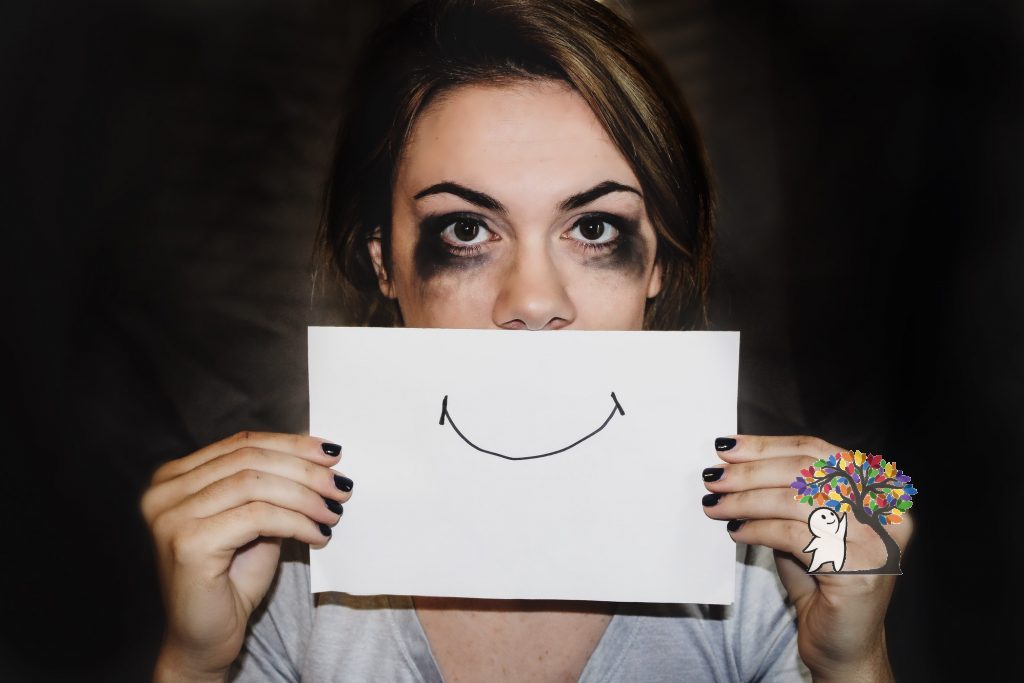6 Signs of Smiling Depression

Hello Psych2Goers! My name is Jade and I am a recent Psychology Graduate, Assistant Psychologist and a new writer with Psych2Go. I hope you will find these articles interesting as I am passionate to help Psych2Go’s mission to make Psychology and Mental Health information accessible to everybody!
As a late teenager, I was diagnosed with GAD (Generalised Anxiety Disorder) and mild depression. Everybody was shocked! I was this bubbly individual who was always smiling. That is the key word…smiling.
Behind that smile, I was hiding a whole world of secret pain and I didn’t know what to do with it. Nobody would have ever known because I had gotten good at wearing my ‘mask’ which I had hidden behind for so long.
When most people imagine a depressed individual, they think of someone who looks really sad or cries a lot. Although this may seem to be an obvious hallmark for depression, not everybody who is experiencing depression or a depressive episode will show how they are feeling. As a result, this type of depression often goes undetected.
It is important to note that this article is purely for educational and interest purposes and is not to be used to self-diagnose depression. If you or somebody you know suspects that they may be suffering with depression, get in touch with your doctor or mental health service to discuss your symptoms further.
Remember, depression is a common mental health condition and affects people in different ways. You are not alone and there is support that you can access if you feel like you need to talk to somebody.
Knowledge is power, so with that in mind, here are 6 Signs of Smiling Depression.
1. People may present as being High Functioning and may appear cheerful, optimistic and generally happy.
According to Heidi McKenzie, PsyD, a clinical psychologist practicing in Pittsburgh, Pennsylvania, Smiling Depression is another name for high-functioning depression or persistent depressive disorder (PDD). People with smiling depression can get up each day, get dressed, show up for work, and continue to interact with others without showing how bad they may be feeling on the inside.
2. People may be active on social media and appear to post the ‘perfect life’
It is estimated that 69% of the U.S. population is using social media and all we seem to see is an alternate reality where everyone’s lives are going so well. But are they really going that well? Many people may not be willing to post pictures when they’re at their worst so will instead opt to share only their good moments with the world. This can create a void that gives smiling depression more room to grow.
3. People may be reluctant to seek help.
Ever heard the saying ‘Real men don’t cry’? Statistics have shown that men are far less likely than women to seek help for mental health problems as they feel that they may be judged for their depressive symptoms. As a result, they are more likely to put on a façade and keep it to themselves.
4. People may be going through some big life changes.
As with other types of depression, smiling depression can be triggered by a situation such as a breakdown of relationship, the death of somebody close to them or a loss of a job. So remember to be kind to people as you never know what is going on for that individual.
5. People will throw themselves into hobbies and work to keep busy.
People who are hiding smiling depression, will throw themselves into being busy. They will find it more difficult to stop doing whatever it is they are doing and address what is really going on for them. This can lead to emotional and physical burn out.
6. People might be completely unaware that they have smiling depression.
According to a paper from the World Health Organization (WHO), smiling depression presents with conflicting symptoms compared to classic depression. Difficulties with diagnosing smiling depression is that many people may not even know they’re depressed or they don’t seek help. If you think you have depression, it’s important to seek treatment as soon as possible.
If you feel like you have experienced or are experiencing suicidal thoughts or that somebody you know may be at risk of harming themselves due to feeling depressed, here are some steps for Suicide Prevention:
- Call your local emergency number.
- Talk to somebody you trust about how you are feeling.
- Remove any items around you or the other person which may cause harm.
- Try the National Suicide Prevention Lifeline at 800-273-8255 and Samaritans https://www.samaritans.org/about-samaritans/our-organisation/ or call 116 123.
- If you’re in distress and want to talk to someone via phone, email or face to face, please find a helpline in your country using the search bar at the top of this webpage: https://www.befrienders.org/contact-us
Remember that nobody should suffer in silence and everybody should have support available when they are going through a difficult period in their lives.
I hope this article has been useful. We are always interested in getting your feedback, so if you have found this article useful or interesting, leave a comment in the box below. This will help us as we continue our mission statement to make Psychology and Mental Health support more accessible.
Keep safe 🙂
J
References:
Bradley, S. (2019) Yes, ‘Smiling Depression’ Is A Thing—Here’s How To Know If You Have It.’ Available at: https://www.womenshealthmag.com/health/a27243083/smiling-depression/ [Accessed on August 5th 2020]
Elmer, J. (2014) ‘Smiling Depression: What You Need to Know.’ Available at: https://www.healthline.com/health/smiling-depression#symptoms [Accessed on August 5th 2020]
Labeaune, R. (2014) ‘The Secret Pain of Smiling Depression.’ Available at: https://www.psychologytoday.com/us/blog/the-guest-room/201411/the-secret-pain-smiling-depression [Accessed on August 5th 2020]
Morin, A. (2020) ‘Why Some People With Depression Look Happy on the Outside?’ Available at : https://www.verywellmind.com/what-is-smiling-depression-4775918 [Accessed on August 5th 2020]



Responses